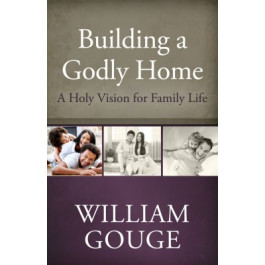I’ve recently been reading a book on Christian family by Puritan William Gouge. Originally titled Of Domestical Duties (1622), it has been revised, broken into three volumes, and retitled: Building a Godly Home, by Reformation Heritage Books. I was reading the section on husbands loving their wives as Christ loved the church when I came upon a wonderful section that needs to be quoted in full, though it is lengthy.

Here Gouge reminds us that Christ gave himself for us, and he did so willingly. He was not hesitant or unsure or forced into it. He did not obey the Father’s will begrudgingly or with grumbling. Rather, the Lord gave himself to be crucified for your sins and mine voluntarily. Before Christ went to Calvary, he had several opportunities to turn back, but he never did. Gouge weaves these instances together in the quote below.
That Christ willingly died is evident by the circumstances noted about His death. When Peter counseled Him to spare Himself, and not to go to Jerusalem where He was to be put to death (Matt. 16:22–23), He called him Satan, and said he was an offense to Him. When Judas went out to betray Him, He said to him, “That thou doest, do quickly” (Jn. 13:27). When Judas had gone out to get other people to apprehend Him, He went to the place where He was accustomed to go, so that Judas might easily find Him (Jn. 18:2). He even met them midway when they came to take Him, and asked them whom they sought, though He knew whom they sought. When they said, “Jesus of Nazareth,” He answered, “I am he.” When they came to Him, He drove them backward with a word of His mouth, and yet would not escape from them (Jn. 18:6). He could have prayed to the Father to have had more than twelve legions of angels for His safeguard against those who apprehended Him, but would not (Matt. 26:53). When He was provoked to come down from the cross by His adversaries, and could have done so, He would not (Matt. 27:42). At the instant of giving up the ghost, He cried with a loud voice, which shows that His life was not yet spent, and He might have retained it longer if He wished. Upon that action, the centurion gathered that He was the Son of God (Mk. 15:39). When He was actually dead and laid in the grave, He rose again (Jn. 2:19; Matt. 28:6). These and other similar circumstances verify that which Christ said of Himself, “No man taketh (my life) from me, but I lay it down of myself” (John 10:18). (from Vol. 1, ch. 4)
In the context of a book on Christian family, Gouge moves on to discuss how Christians in general should be willing to lay down their lives for one another (1 Jn. 3:16) and husbands in particular should willingly lay down their lives for their wives (Eph. 5:25). But I found myself just lingering on this passage in joy and wonder at a Savior who willingly laid down his life for a wretch like me. Knowing all he knows of you and me—all our sins past, our current hangups and habits, and our future sins we haven’t even thought of yet—he willingly gave himself anyway. Take confidence and joy in the fact that your Savior has no regrets in dying for your sins.
“Greater love has no one than this, that someone lay down his life for his friends.” (John 15:13)
What a wonderful Savior!
